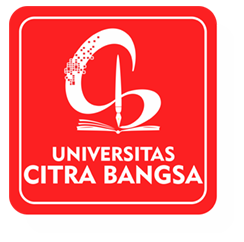PENGGUNAAN EDMODO BERBASIS ANDROID UNTUK MENDUKUNG PEMBELAJARAN PENDIDIKAN INFORMATIKA UNIVERSITAS CITRA BANGSA KUPANG
Keywords:
android, edmodo, pembelajaranAbstract
Raymundus F. Soro, 2019, Penggunaan Edmodo Berbasis Android Untuk Mendukung Pembelajaran Pendidikan Informatika Universitas Citra Bangsa. Universitas Citra Bangsa. Pembimbing Ellen Tantrisna,S.Kom.,MMSI & Jhon Enstein, S.Kom.,M.Cs. Penelitian ini bertujuan: Untuk menganalisis penggunaan edmodo berbasis android dalam mendukung pembelajaran pada Program Studi Pendidikan Informatika Universitas Citra Bangsa. Metode dalam penelitian ini adalah pendekatan kuantitatif dengan analisis data statistik deskriptif. Data penelitian diperoleh berdasarkan pembagian kuisioner terhadap mahasiswa. Hasil penelitian berdasakan penyebaran kuesioner yang diberikan kepada 27 responden menunjukkan bahwa tingkat penggunaan edmodo termasuk pada kategori tinggi sebesar 44,44 %, sedangkan dalam mendukung pembelajaran pendidikan informatika termasuk pada kategori tinggi sebesar 59,26 %. Dari hasil ini menunjukan bahwa nilai koefisien korelasi (r) lebih besar dari r tabel yaitu 0,797 > 0,367 dan nilai signifikansi memperoleh hasil lebih kecil dari nilai signifikansi yang telah ditetapkan yaitu 0,00 < 0,05. Jadi dapat disimpulkan bahwa penggunaan edmodo berbasis android dapat mendukung pembelajaran pendidikan informatika pada mata kuliah Sistem Operasi dan Jaringan Komputer semester III dan V Universitas Citra Bangsa.
Downloads
Downloads
Published
How to Cite
Issue
Section
License
Every works in JUMPIKA is licensed under a Creative Commons Attribution-ShareAlike 4.0 International License.
Authors who publish with this journal agree to the following terms:
- Authors retain copyright and grant the journal right of first publication with the work simultaneously licensed under a Creative Commons Attribution License that allows others to share the work with an acknowledgment of the work's authorship and initial publication in this journal.
- Authors are able to enter into separate, additional contractual arrangements for the non-exclusive distribution of the journal's published version of the work (e.g., post it to an institutional repository or publish it in a book), with an acknowledgment of its initial publication in this journal.
- Authors are permitted and encouraged to post their work online (e.g., in institutional repositories or on their website) prior to and during the submission process, as it can lead to productive exchanges, as well as earlier and greater citation of published work (See The Effect of Open Access).




